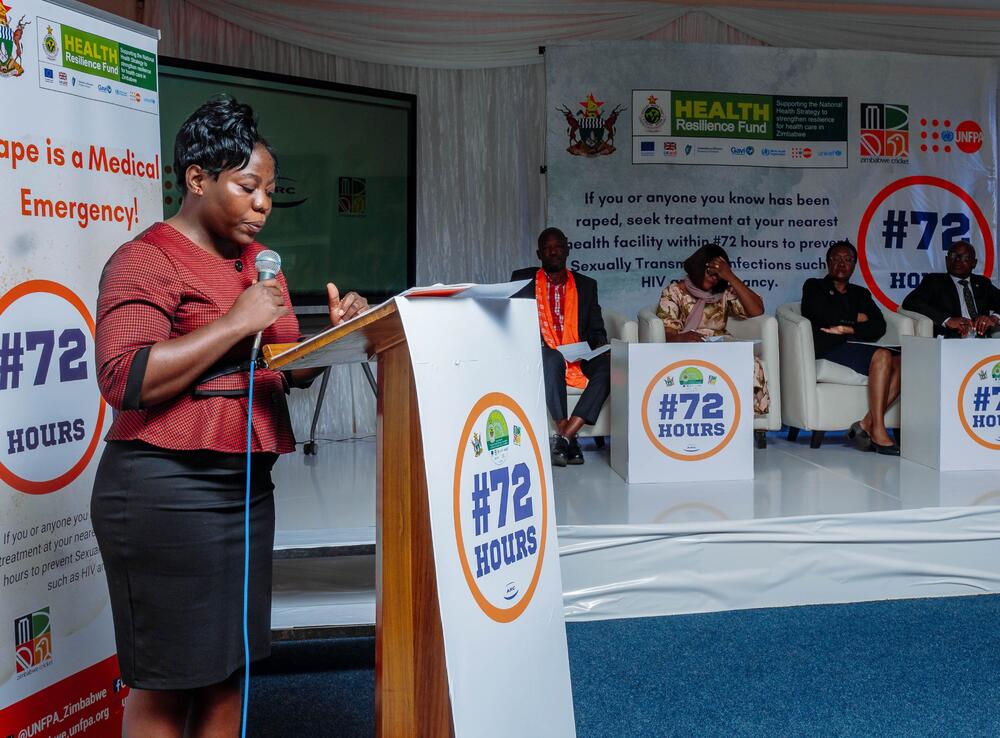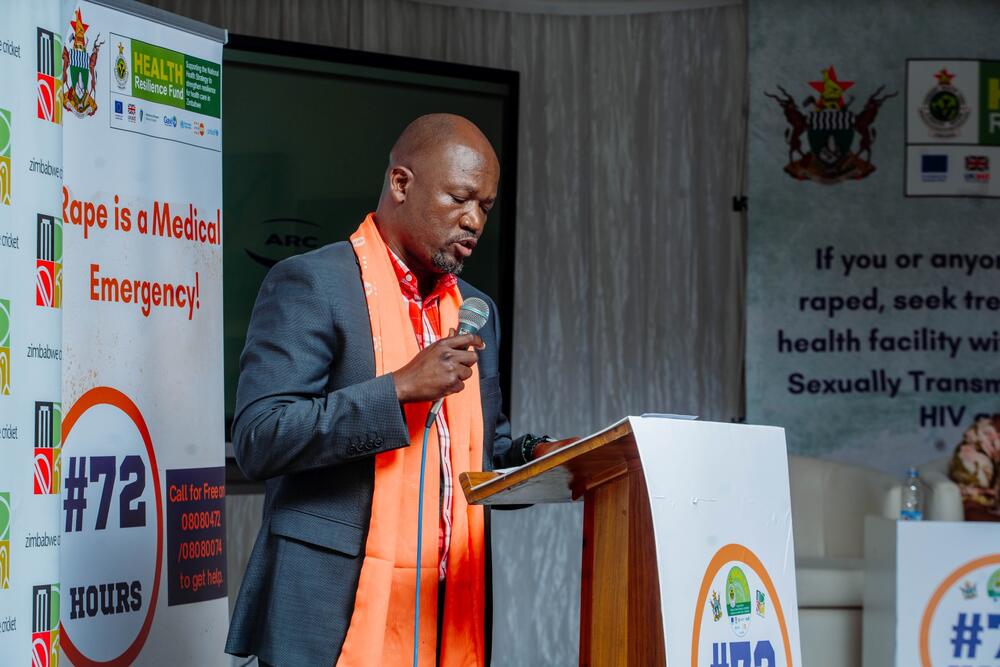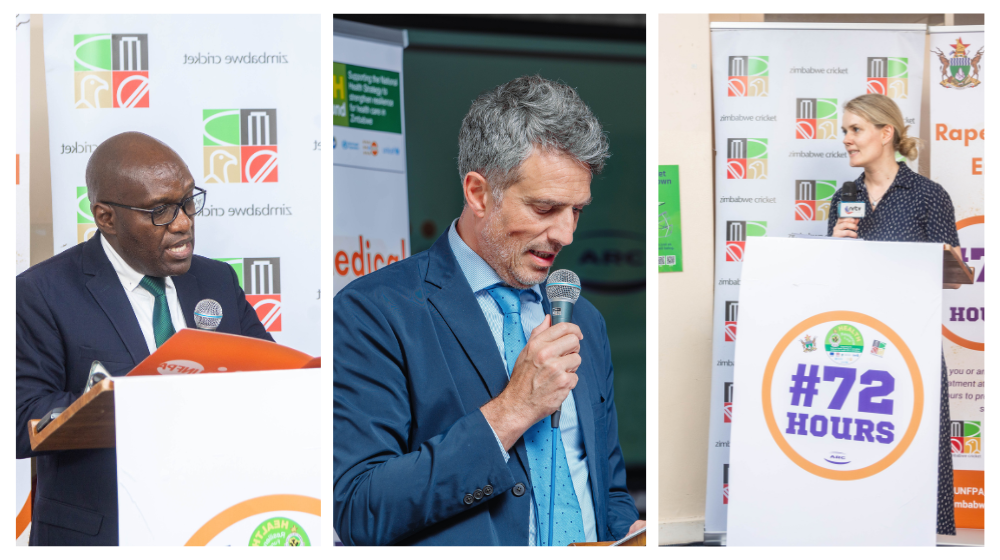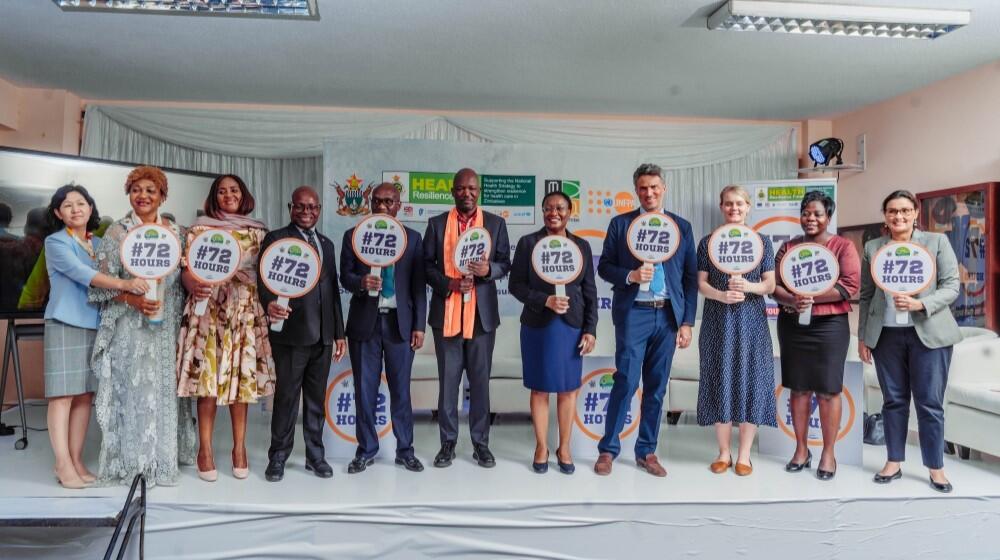Harare, Zimbabwe, 6 November 2024 - Ahead of the 16 Days of Activism Against Gender Based Violence (GBV) the Government of Zimbabwe and the United Nations Population Fund partnered with the Zimbabwe Cricket and Adult Rape Clinic to launch the #72Hours Campaign, urging survivors of sexual and gender-based violence to seek timely and life-saving support within 72 hours.
Sexual and gender-based violence, including rape, remains a pervasive issue in Zimbabwe, with many survivors facing barriers to accessing critical services within the recommended 72 hours—a vital period for the effectiveness of emergency contraception and prophylactic treatments against sexually-transmitted infections (STIs), including HIV. Currently, fewer than 35 per cent of survivors seek support within this timeframe, underscoring an urgent need for greater awareness and access.
“I appeal to all of us to join hands in support of survivors of sexual violence, urging us to prioritize health and seek medical attention for them. The health of survivors matters, and they do not need to suffer additional health losses from the traumatic experience,” said Adult Rape Clinic Director Maceline Mukwamba.

Launching the campaign, UNFPA Regional Director for East and Southern Africa, Ms. Lydia Zigomo, highlighted the significance of the campaign, stating, “About one in four women in Zimbabwe have experienced sexual violence since the age of 15. It is disturbing that so many survivors miss the 72-hour window to access critical and essential health services.” She further added, “Through the launch of this campaign, UNFPA together with relevant Government Ministries and partners, will intensify efforts to reach survivors with information on the benefits of accessing services.”
Lack of awareness and stigma are key reasons survivors delay accessing services, often missing the critical timeframe to receive medical support and preserve forensic evidence for possible legal action. This campaign will focus on spreading knowledge about the importance of acting quickly and offer survivors essential information on accessing services.
Sexual and gender-based violence has far-reaching consequences. Survivors often face physical injuries, psychological trauma, and long-term health complications. These can include chronic pain, sexually transmitted infections including HIV, unwanted pregnancies, and mental health conditions such as depression, anxiety and suicidal attempts..
“Sexual and gender-based violence (SGBV) is not only a human rights violation but also a public health challenge which undermines the health and well-being of survivors. It is imperative that we, as healthcare professionals, policymakers, and community members, take a proactive stance in responding to and preventing SGBV,” said the Minister of Health and Child Care, Dr. Douglas Mombeshora in a speech read on his behalf by Dr. Stephen Banda, Acting Chief Director Policy and Planning.
In an effort to reduce GBV, UNFPA has adopted comprehensive service models from policy advocacy to helping survivors receive holistic support working with various Government ministries such as the Ministry of Women Affairs, Gender and Community Development and the Ministry of Health and Child Care and civil society. One key model adopted to improve timely access to services for survivors is the One Stop Centres (OSCs) where survivors can access services (health, psychosocial support, legal and police) under one roof free of charge. To date, eight OSCs have been established at hospitals in Harare, Manicaland, Mashonaland West, Mashonaland Central, Masvingo, Midlands, Bulawayo and Matabeleland South provinces.
“Prevention and Protection, Care and Support Services are two of the 7 priority areas in our National Strategy to Prevent and Address Gender Based Violence,” said Hon. Monica Mutsvangwa, Minister of Women’s Affairs, Community, Small and Medium Enterprises Development in a speech read on her behalf by Chief Director Ms. Lillian Matsika-Takaindisa, adding: “This campaign will increase awareness on the need to access life saving health services timely. It is our hope that every stakeholder working on GBV prevention and response will amplify the message in your respective spaces.”
Sports has a powerful role in driving social norm change, often serving as a platform for challenging stereotypes, promoting inclusivity, addressing harmful social norms and inspiring social progress. UNFPA’s partnership with Zimbabwe Cricket will be key to amplify the #72Hours Campaign as cricket players will be champions of change, supporting awareness raising on GBV prevention and response through video messages that will be disseminated nationwide.

“Sport, as a unifier, educator and influencer, has immense power to address the harmful stereotypes, attitudes and beliefs that contribute to gender inequity and fuel gender-based violence,” said Zimbabwe Cricket Managing Director Givemore Makoni. He added: “Sport has traditionally been associated with masculine ideals of strength and competition. However, as we actively champion women in cricket and promote female participation at all levels of our sport, we are challenging outdated perceptions of gender roles. We challenge the narrative that places limits based on gender, and we redefine the norms that dictate how people perceive themselves and others.”
The #72 Hours Campaign is being implemented with the support of the Health Resilience Fund programme which is funded by the Governments of Britain, Ireland and the European Union.
"We are proud to support this important new #72 hours campaign, which emphasises the critical need for survivors of sexual assault to access support services within 72 hours. This campaign is a valuable part of the wider ongoing work to tackle gender-based violence and gender inequality in Zimbabwe. As the UK, we are honoured to be part of the collective effort working towards a world free from gender-based violence" said Caitlin Spence, Social Development Adviser, British Embassy Harare.
European Union Head of Cooperation Mr Franck Porte said: “The European Union has remained steadfast in supporting Zimbabwe's efforts to combat gender-based violence over the years. Through the Health Resilience Fund, we have strengthened essential services that survivors can access within the critical 72-hour window, ensuring timely health interventions, counseling, and forensic support. We believe that the #72Hours campaign will encourage survivors to seek help without delay, empowering them to access life-saving services when they need them most.”

“The Embassy of Ireland firmly supports the 72 Hours Campaign, sending the critical message to SGBV survivors to seek critical medical services in time to prevent STIs and unwanted pregnancies. Ireland is proud to support efforts in Zimbabwe to end gender based violence and ensure all women have access to sexual and reproductive health and rights services, through our investment in the Health Resilience Fund,” said Programme Manager and co-chair of the Health Resilience Fund Mr. Dumisile Msimanga at the launch.


